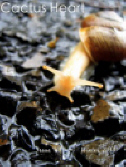Cactus Heart – Winter 2013
In her editor’s note, Sara Rauch hopes that this issue will “bring the bright and wild and unusual into your spirit this winter.” Certainly, there are images such as these throughout the issue that bring a little warmth to my room: “there lies me and you sitting on the floor / with a bucket of strawberries, whipped cream . . .” (Shannon Shuster’s “alright .”); “standing at the water’s edge / leaning against the night breeze / taut as harp strings for balance” (Ned Randle’s “Lake Song”); “When I was younger I would wait / for the first bloom of the blackberry / thickets and collect berries in a mason jar” (Matthew Wimberley’s “Indian Summer, Reading Lorca”); and “The heat pins my shirt to my skin like a silver star” (Arah McManamna’s “Cactus Flower”).
In her editor’s note, Sara Rauch hopes that this issue will “bring the bright and wild and unusual into your spirit this winter.” Certainly, there are images such as these throughout the issue that bring a little warmth to my room: “there lies me and you sitting on the floor / with a bucket of strawberries, whipped cream . . .” (Shannon Shuster’s “alright .”); “standing at the water’s edge / leaning against the night breeze / taut as harp strings for balance” (Ned Randle’s “Lake Song”); “When I was younger I would wait / for the first bloom of the blackberry / thickets and collect berries in a mason jar” (Matthew Wimberley’s “Indian Summer, Reading Lorca”); and “The heat pins my shirt to my skin like a silver star” (Arah McManamna’s “Cactus Flower”).
Appropriately, the issue begins with the poem “Intro,” by M. E. Gallucci, which starts “(this is a thing of / movement.)”:
A brook ballooning to a
stream ballooning to a
river
ranging, roving, roaring,
raveling and unraveling only to be
wound again—
Joe Baumann’s “The Peak of the Night” is a tale of, as the character Father Boundia would say, a miracle. It brings forth the unusual spirit that Rauch speaks of. George Amos discovers a patch of space outside of the church where time slows down. Becoming a phenomenon, this “mystery, as the reporters call it, is news all over town. The church starts to fill up, and the Father couldn’t be happier. Yet, it seems like in the spot where time slows, pain is excruciating. Father Boundia watches some boys play, and one of them throws a baseball at the other:
Father Boundia imagined what must be going through the boy’s head. When he’d walked through the miracle that afternoon, Father Boundia had experienced the bizarre sensation of having his whole body slow down—his arms and legs, his breathing, even his heartbeat—while his thoughts moved as normal . . . So when he saw the baseball thud against the boy’s ribcage, he tried to imagine the sharp pain of contact stretched out, the initial smack lasting longer, the sting coursing through the boy’s nervous system. The thought of being trapped with that pain, unable to move as normal, forced to watch one’s body start to write and not be able to do anything to soothe that feeling . . .
There is more fiction in this issue, more poems, a piece of nonfiction, and a couple of translations. Cozy up and read; find the “bright and wild” scattered throughout the issue.
[www.cactusheartpress.com]






